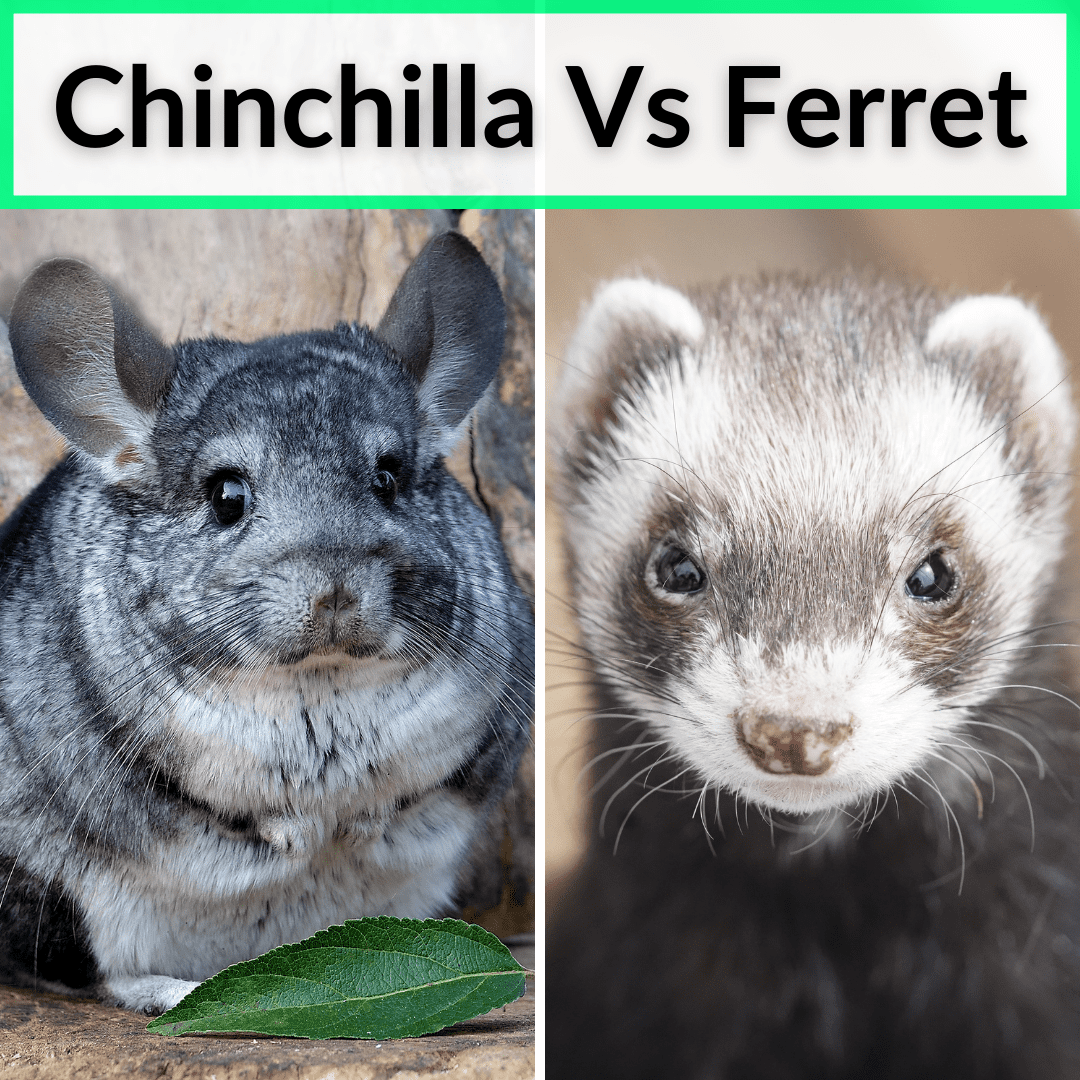
My one-year old son was obsessed with our 100 pound yellow lab, but I thought a smaller pet would be easier for him to deal with.
I knew I wanted a rodent, but was not sure which one.
Ferrets and chinchillas were both at the top of my list.
I ended up compiling a pros and cons list of the chinchilla vs ferret. The name of this site should give you a clue which animal won out in the end.
But that doesn’t mean the chinchilla is the best choice for everyone.
Keep reading for a complete comparison of ferrets and chinchillas to help you figure out which one is the better pet for you.
Contents
Ferret Vs Chinchilla
The goal of this post is not to sway you towards one side or the other. Obviously I own and prefer the chinchilla and that is the winner for me, but I realize that others may be better off with a ferret.
That’s why I will remain mostly neutral neutral and simply present the pros and cons of owning a ferret vs a chinchilla, just like I have done in all of my other comparison posts, like hedgehog vs chinchilla.
This post will be a guide in creating a scoresheet as to which pet is the one you should ultimately adopt. But I know my preference will sneak in at times, so just be aware that I prefer the chinchilla.
In case you are wondering, the reason I ultimately decided on the chinchilla is that they are more sociable, they are cleaner, and they have a longer average lifespan.
But I have nothing against ferrets and know that they also make great family pets. I try to play a fair game when it comes to these comparisons.
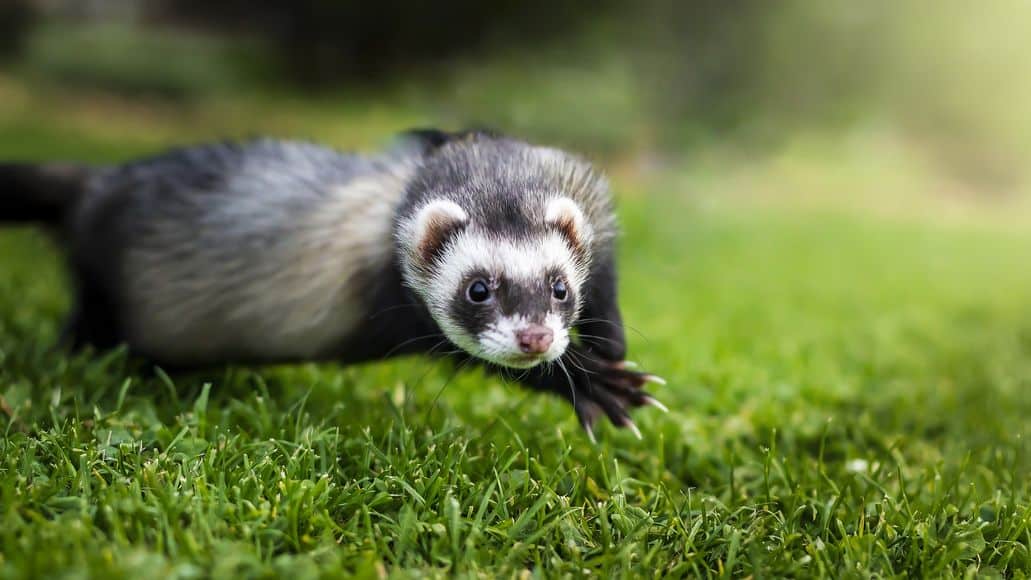
You can even check out my blog post about if a chinchilla is better than a rabbit, so you can see how I keep score during these matchups.
The bottom line is that owning a chinchilla is different from owning a ferret in many ways. So let’s begin this comparison with a look at the differences between chinchillas and ferrets.
Key Differences Between Chinchillas And Ferrets
Here is a rundown of the major differences between ferrets and chinchillas. This should help you figure out which of these animals is better suited to being your pet.
Chinchillas Are More Social Than Ferrets
One of the most significant differences between a chinchilla and a ferret is the ferret’s social skills. As ferrets mature, they tend not to be as socially active as chinchillas.
They are predators and are perfectly content not having tons of interactions with other animals or with humans.
On the flip side, chinchillas are quite social. Once they get used to you, they love spending time with you (in fact, they need it). The same goes for other chinchillas.
That said, both pets are capable of social interaction with family members and their owners.
They may show it any different ways, but with proper care and some love from you, they both turn into great pets that learn to recognize their owners.
Ferrets Are Carnivores

There are some key differences in the dietary needs between ferrets and chinchillas. First, chinchillas are about as easy as it gets when it comes to providing the correct diet.
They need timothy hay and chinchilla formulated pellets. Outside of this, you can offer them the occasional treat, as long as you make sure you know what foods are safe. But treats are not a necessity.
Ferrets, on the other hand, are carnivores. That means you need to feed them meat. This usually takes the form of frozen baby chicks. For many, this is a huge turnoff.
On the plus side for the ferret, their digestive tracts are not as sensitive as that of the chinchilla. This reduces the risk of accidentally feeding them something harmful.
I won’t go into much more detail on the dietary needs of each animal here. Suffice it to say that you’ll have to feed animals to ferrets, but you won’t have to be as careful not to feed something harmful.
If you want more information about ferrets, you can check out this site. For chinchillas, you’re already in the right place.
Read my post about the best types of hay to give your chinchilla and my companion post covering pellets for your chinchilla. I also have information about the types of fruits you can safely offer as treats.
In a head to head battle between the chinchilla and the ferret, I don’t think the diet makes for a clear cut winner. But if you do not want to feed your pet whole animals, then you probably already have a winner: the chinchilla.
Chinchillas Are Cleaner
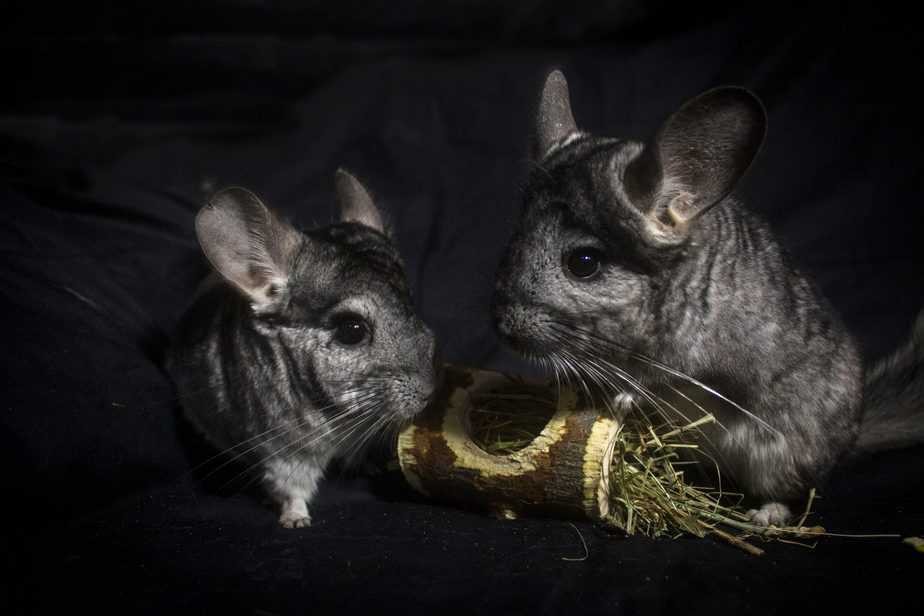
When it comes to cleanliness, the chinchilla is the clear-cut winner. It’s nothing against ferrets, but chinchillas are very clean animals.
They are great for people with allergies, because they barely shed and produce nearly no dander.
This is due to incredibly dense fur that requires nothing more than a dust bath to stay clean and luscious.
What’s more, you can litter train chinchillas to urinate in a litter pan. You can’t do the same for poop, but their poop comes out on little pellets that have no odor, so that is another plus point.
With a few helpful pointers, chinchillas can be one of the cleanest pets you can choose to adopt in general.
Ferrets, on the other hand, shed a bit more and will require some brushing from time to time. They are also known to produce a bit more of an odor.
Chinchillas are the opposite and, for the most part, do not smell at all.
Again, I’m not bashing the ferret by any means. It’s just that chinchillas are incredibly clean pets and they win this battle by a long shot.
Negligible Cost Differences
Obviously, cost does depend on you. You can spend a ton of money on either of these pets, if you choose to buy them tons of accessories and other items.
But when it comes to the necessities, both of these animals are cheaper than most other pets. Neither requires a ton of specialized equipment.
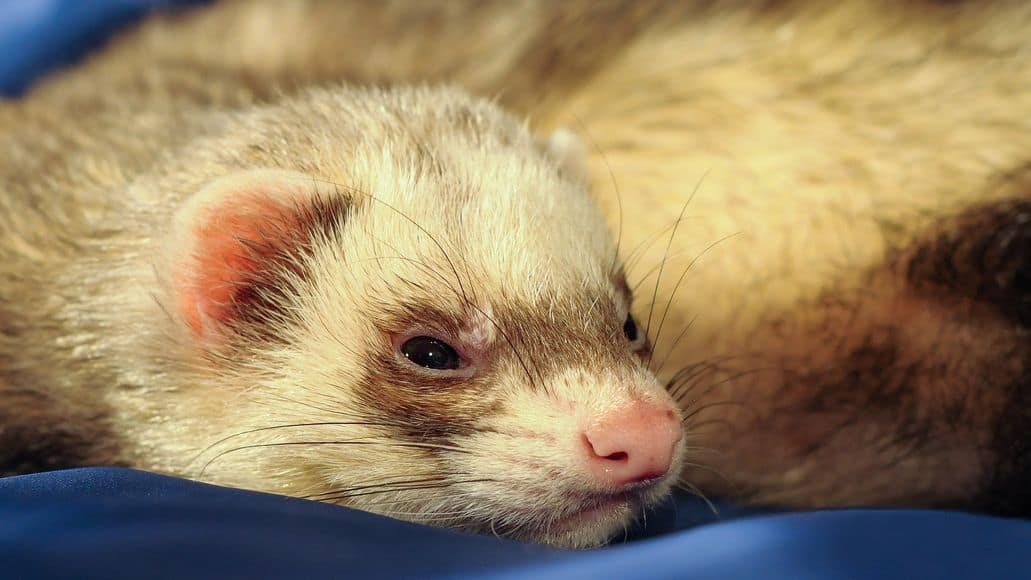
If you make smart choices, you will only have to spend a few hundred dollars for everything. And that assumes high quality products, especially a top quality cage.
It is always best to spend a bit more on the cage, to avoid having to upgrade later. Spend more now and save much more in the long run.
The same goes for bedding options. I use fleece liners that can be re-used, as opposed to spending money on aspen shavings on a recurring base. Again, spend more initially, but save much more in the long run.
This is always tough to pinpoint because it really depends on the kind of pet owner you decide to be.
When it comes to accessories, the most important ones are not overly expensive at all. Of course, there are so many toys available for both ferrets and chinchillas, that you can spend an unlimited amount of money, if you like.
Overall, the cost is close at initial adoption.
Chinchillas can run anywhere from $75 to $250 for one chinchilla, depending on the color or mutation you choose to adopt.
Ferrets are typically $65 to $225, but they usually need vaccinations and have some other veterinary needs early into the adoption. Chinchillas do not need shots.
Chinchillas are smaller, but they require a tall cage with plenty of vertical space to jump and climb.
The Critter Nation 2 Dual Level Cage I use and recommend runs you about $250, but this is a one-time cost that you shouldn’t have to encounter ever again with some proper cleaning and maintenance.
A ferret cage costs around the same. Overall, the cost is unlikely to be a huge determining factor as to which of these animals would be better for you. There just isn’t much difference here.
Differences In Behavior And Temperament
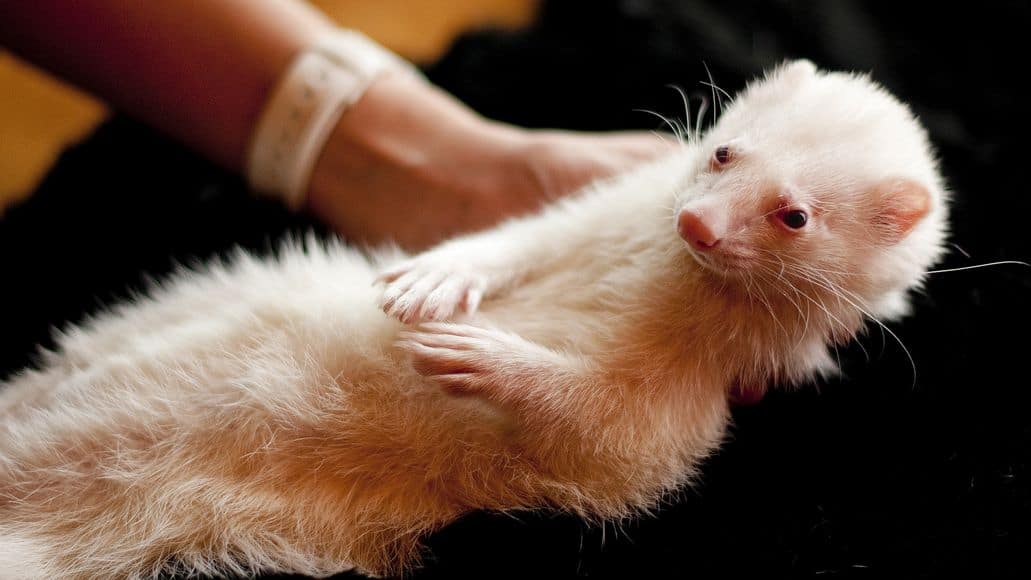
Next comes the enjoyable conversation about which one of these furry pets has the winning personality.
Behavior is always an important consideration to keep in mind. Chinchillas are friendly and social creatures that do build bonds with their owners.
Not to mention, chinchillas can be very entertaining with their unique springing and jumping abilities.
But the ferret is by no means a boring pet that’s not capable of showing love. They certainly can be friendly, loving pets as well.
They just don’t like humans and other animals nearly as much as chinchillas do.
Chinchillas are not known to bite in most circumstances, which is clearly a plus.
But ferrets are also not usually biters, unless they are in pain, or they are trying to signal some other message to you.
Overall, for the more entertaining and interactive pet, I’d lean towards a chinchilla. They are also a bit easier to tame. And they love to cuddle and be held, once you build trust and if you pet your chinchilla where it likes to be pet.
Need To Set Up A Safe Play Area
No matter which of these two pets you ultimately decide to purchase, proofing an area for time out of the cage is going to be necessary.
Chinchillas absolutely love some time out of the cage, but they are ninjas at finding small spaces to squeeze between, and you must be leery of dangerous items that can be chewed, such as cords or wires.
The same is true for the ferret.
Choosing one of these pets over the other is not going to save you any time or any effort when it comes to pet-proofing an area in your home.
Ferret Or Chinchilla: Which To Choose?

When I initially started this post, I had it in my mind that the chinchilla was the clear winner. It is the pet I chose, after all. And, to be honest, it is still the pet I’d choose to adopt.
However, I was surprised to see how great a ferret can be as a pet as well. One thing I didn’t like, however, is that a ferret is perfectly content whether you around or not.
A chinchilla will always be a bigger fan of yours than a ferret, but it also means you need to spend some time with it every day.
I like putting in the little extra effort, but I do understand that this could also be a strong reason for someone to choose a ferret instead.
Another thing to keep in mind is that a chinchilla does have double the life span, which is a definite win in my book.
Chinchillas can live 15 to 20 years with proper care, so they make for a great long-term pet that can bring joy to a family for many years.
On the flip side, maybe that’s not what you’re looking for. If that’s the case, a ferret may make more sense for you.
I also love the odor bonus points for a chinchilla. Chinchillas are clean animals that are about as easy as it gets to care for.
I haven’t owned a ferret, but I have noticed that the consensus is that ferrets are also clean animals that groom themselves.
However, it does seem that ferrets typically have more of an odor than chinchillas, which is a downside for me.
Ferrets are known to leave a musky smell in the room where their habitat is kept. Chinchillas smell like a rodent and produce a very minimal odor. This is a big win for the chin.
Chinchilla Vs Ferret: Final Thoughts
At the end of the day, both options can bring joy to any family. Ferrets do not look as adorable as chinchillas, and they are less social, smell stronger and do not live as long.
This makes the chinchilla the clear winner for me.
I’d rather have a pet that wants and needs social interaction, as opposed to one that’s perfectly fine never seeing me. I also like that they do not smell and do not need any grooming.
But for many of you, the exact opposite might be true. Perhaps you prefer a pet that can be left alone more and that you can feed animals.
Or perhaps you simply can’t make up your mind and end up getting both. Do ferrets and chinchillas get along? Since one is a natural predator and the other natural prey, they do not generally get along. If you have both, keep them separated at all times.
Share your thoughts and concerns.
Now it’s time for you to chime in on the topic, especially if you currently own a ferret.
What argument can you make that ferrets make the superior pet?
What other pros and cons of either pet can you lay out for the audience here today?
Be sure to share your stories, thoughts, and concerns by dropping a comment below.
As always, Chili and I appreciate you stopping by, and we will see you next time.
Leave a Reply